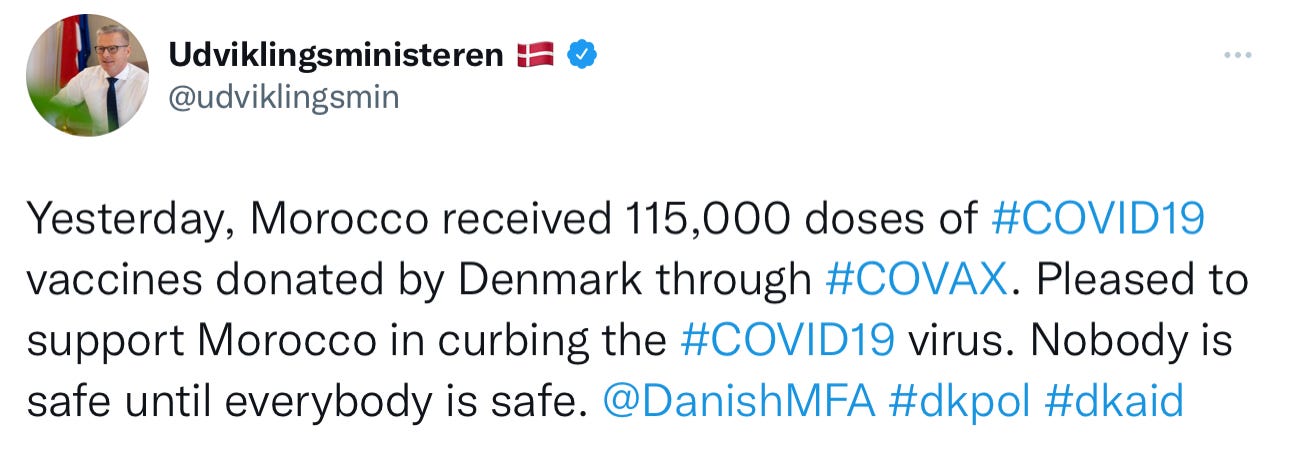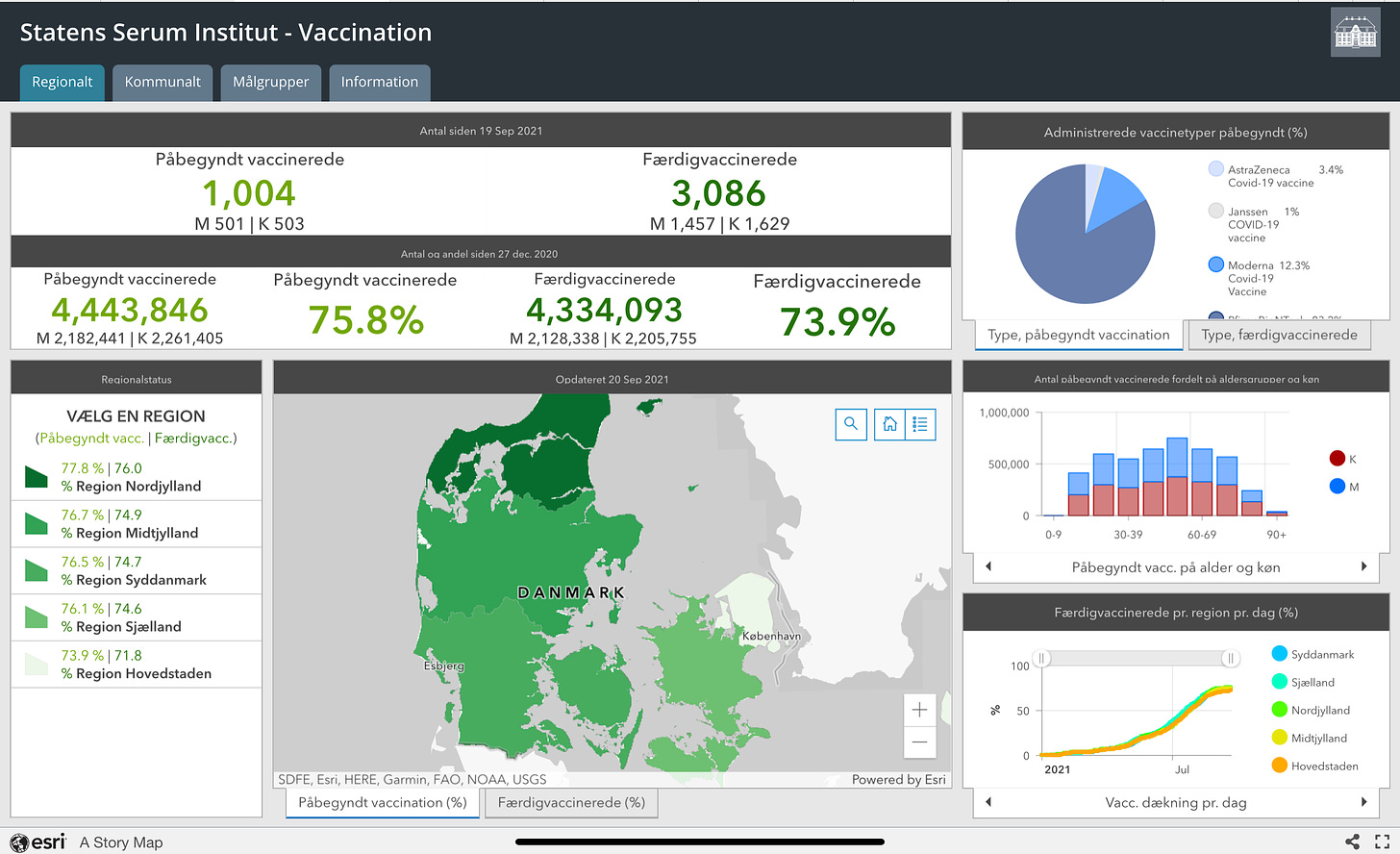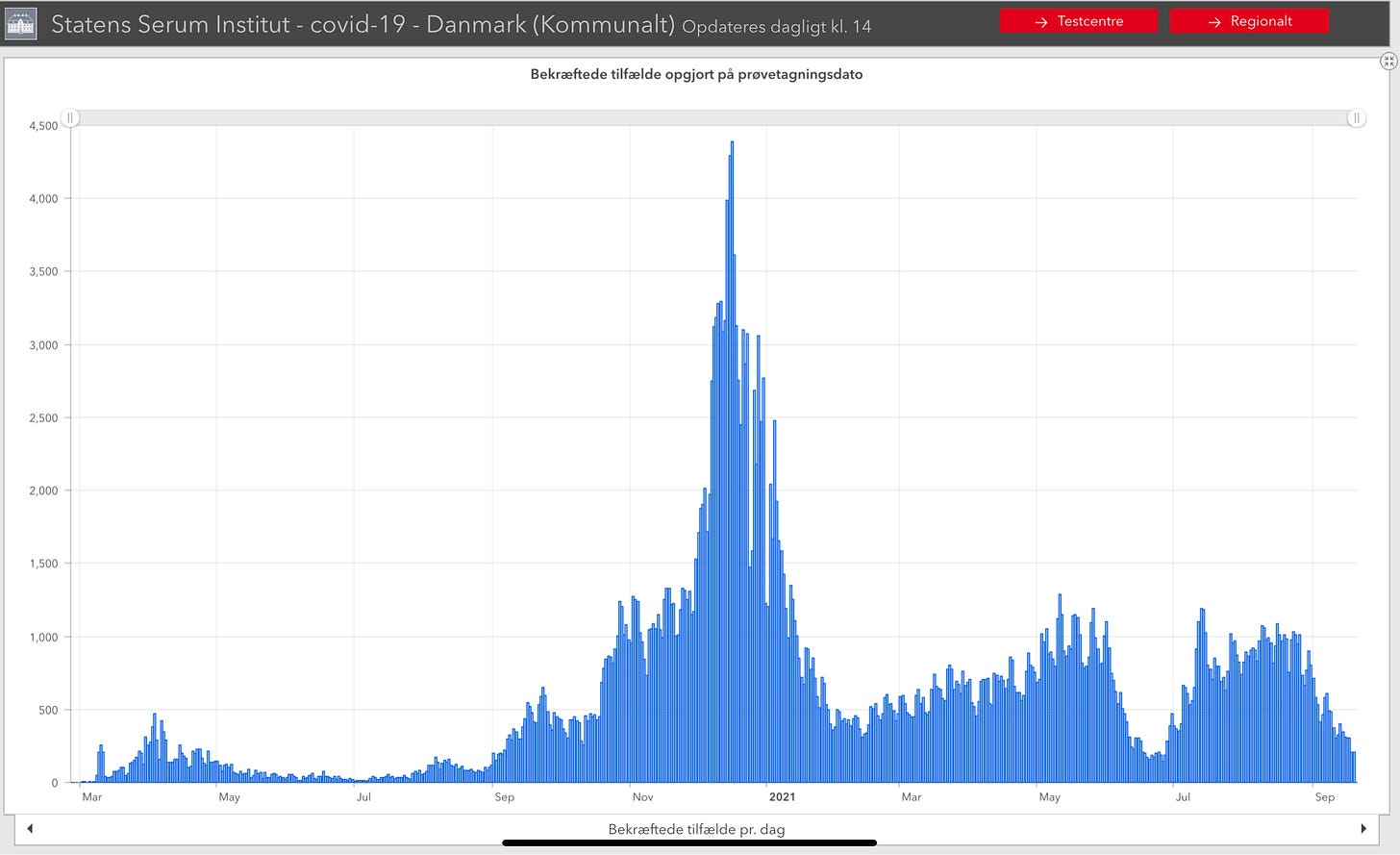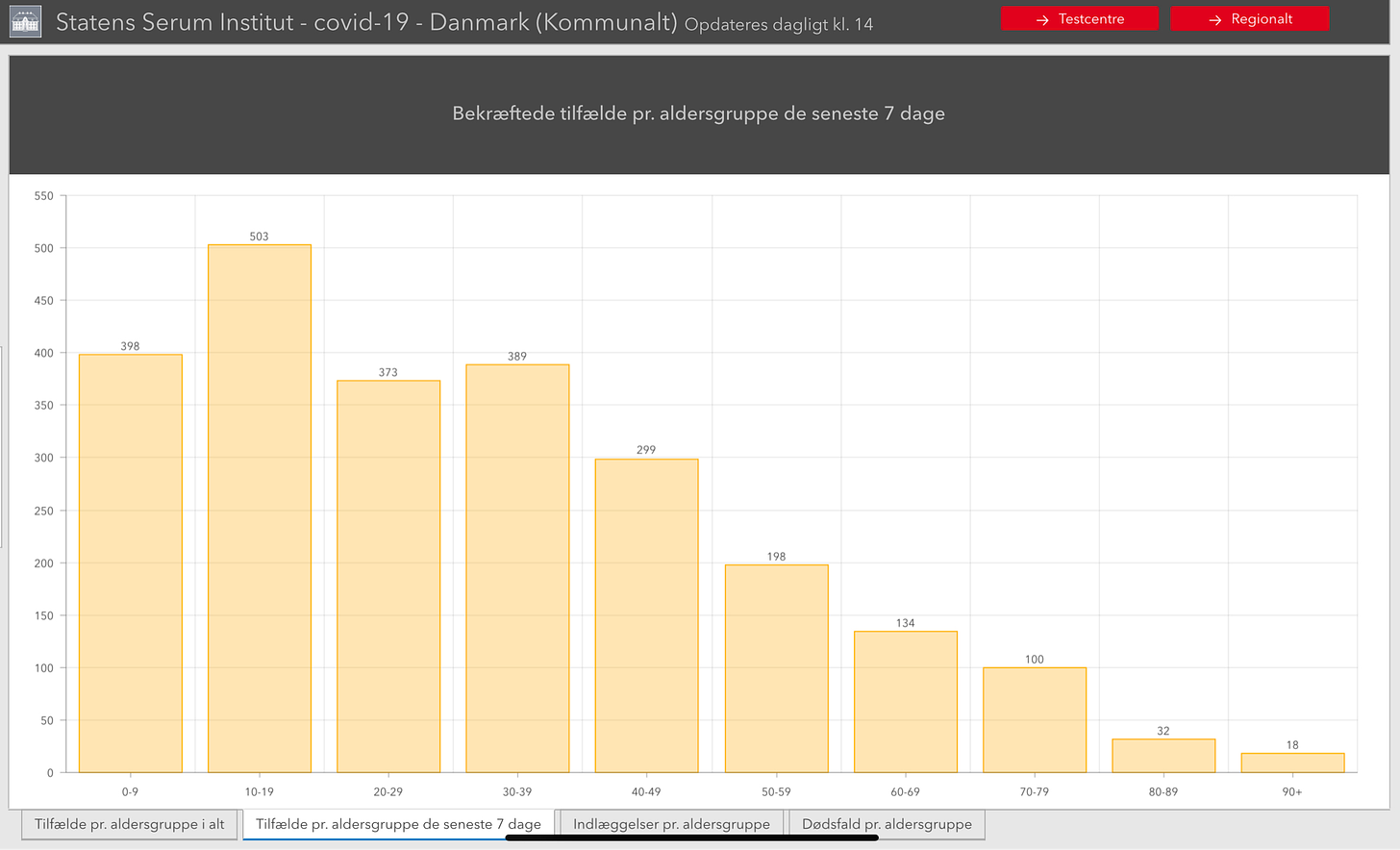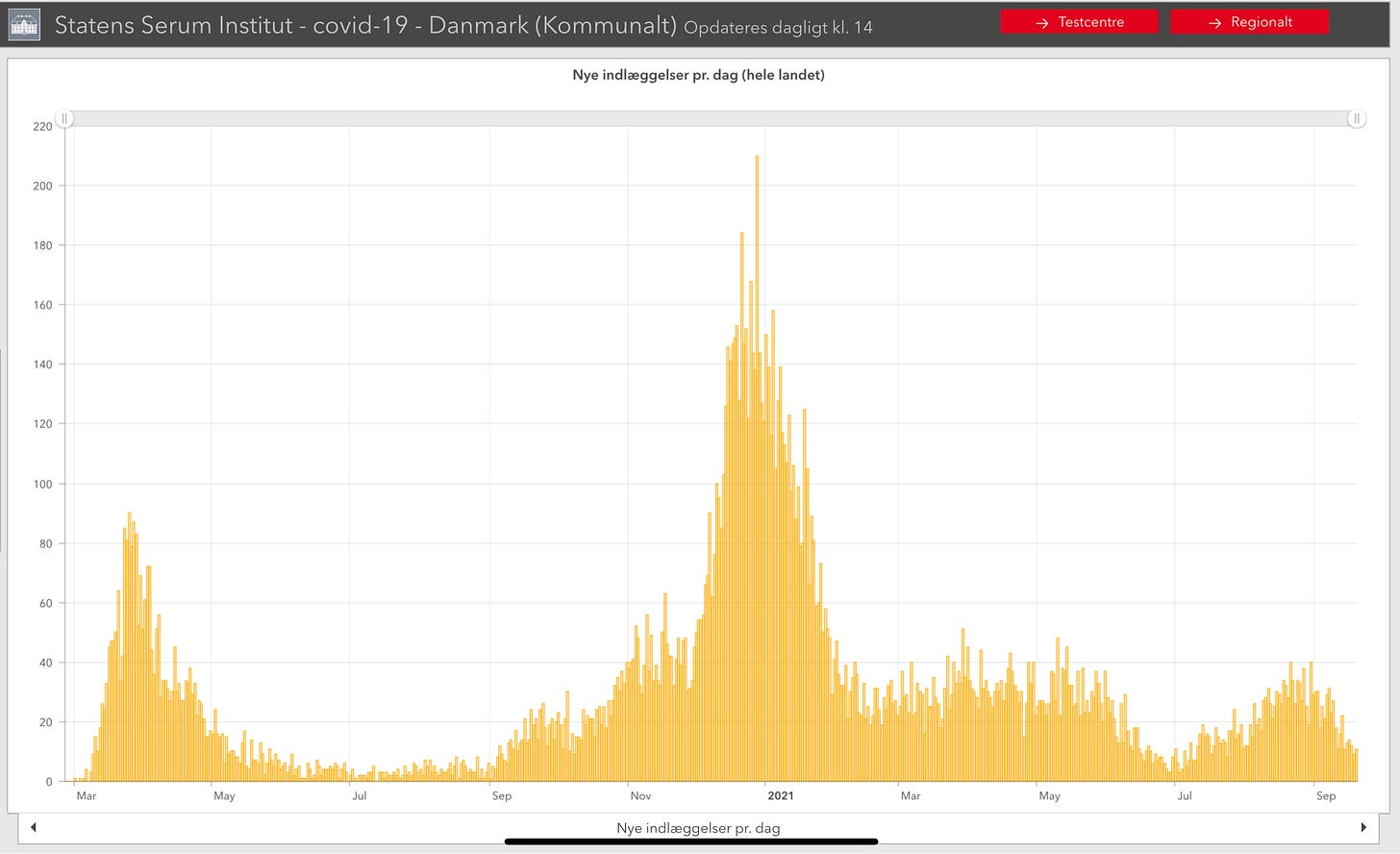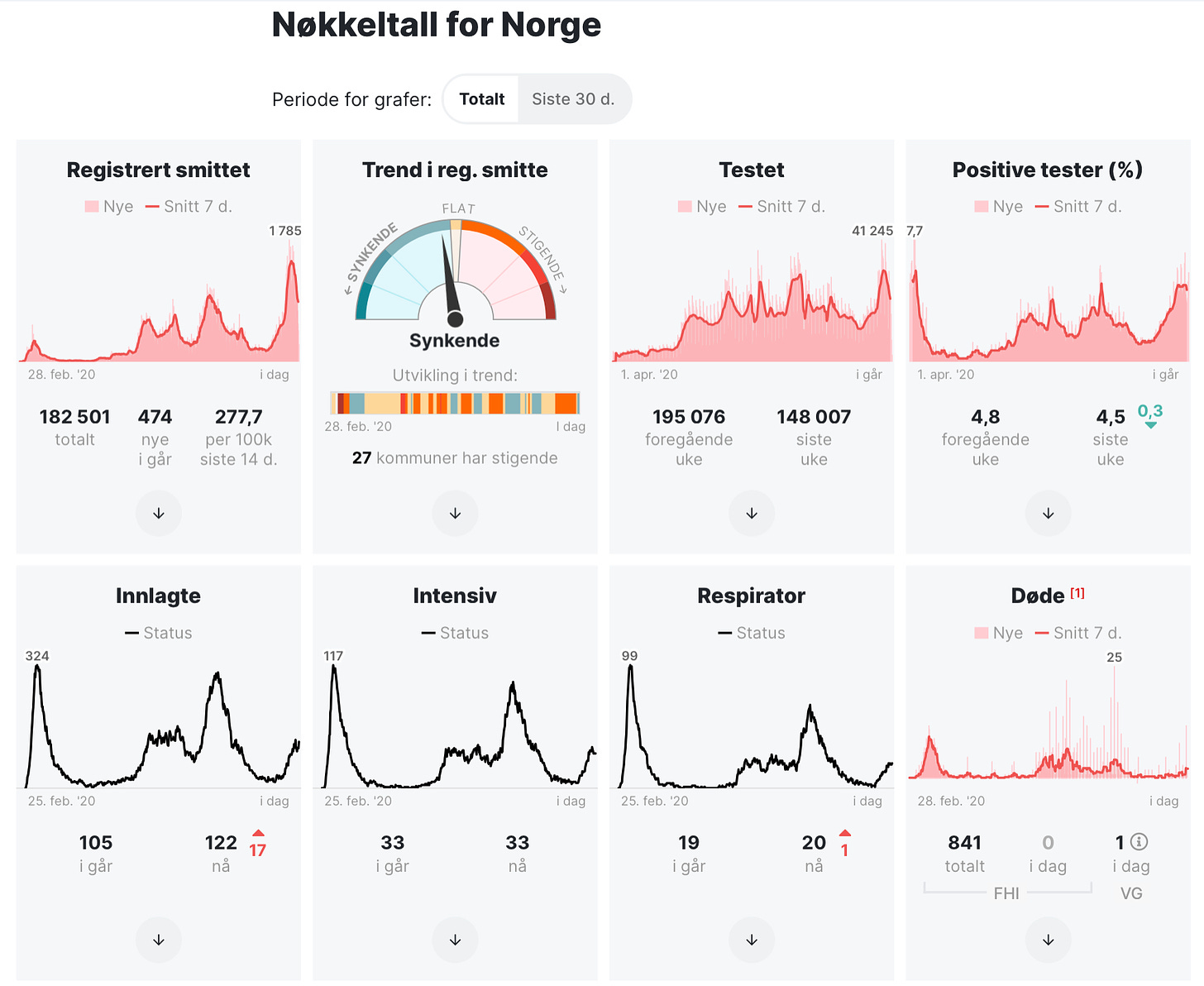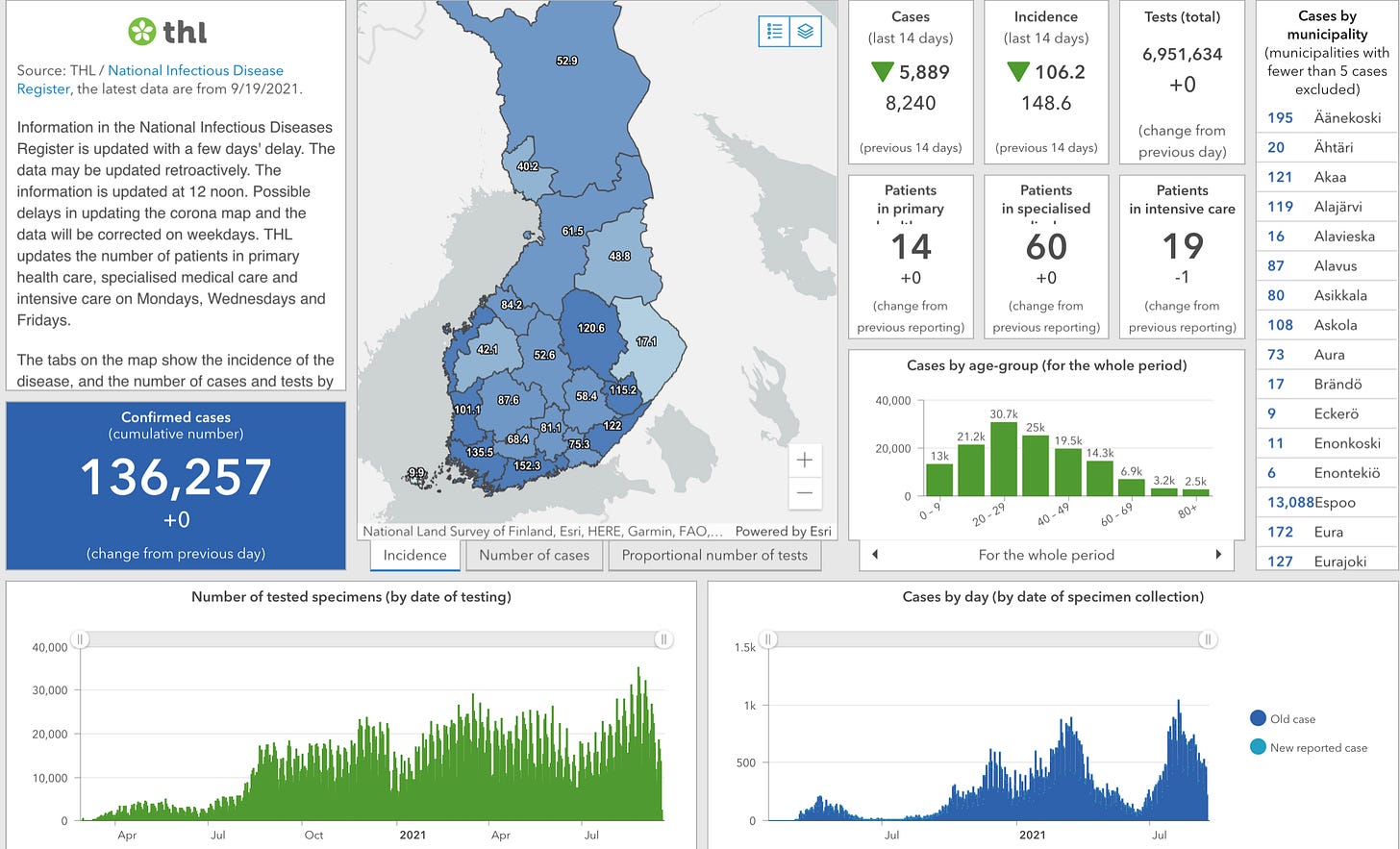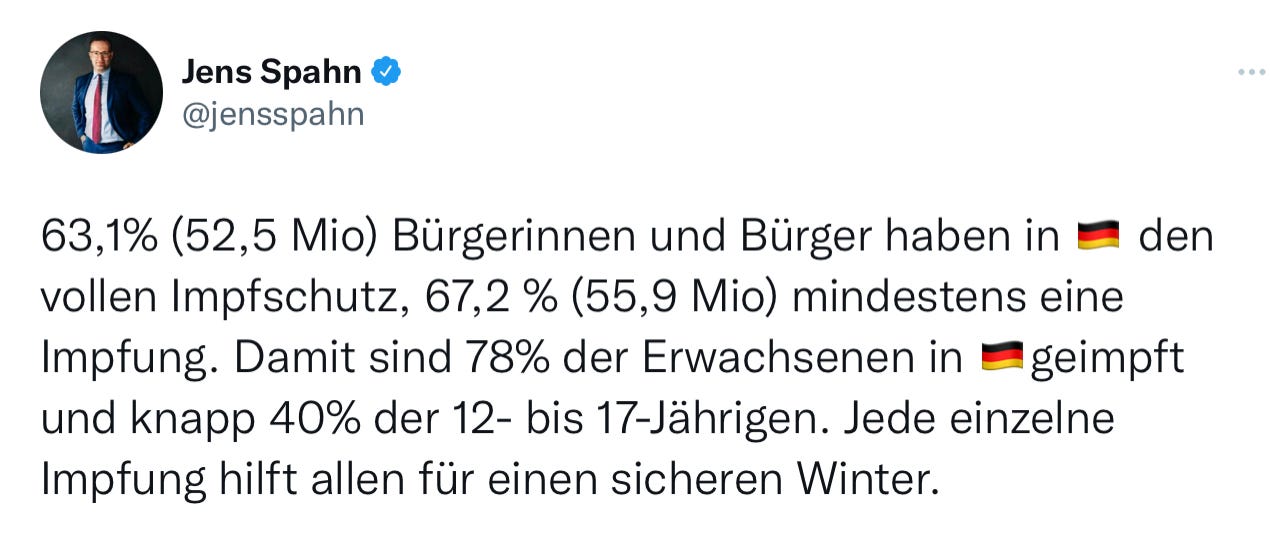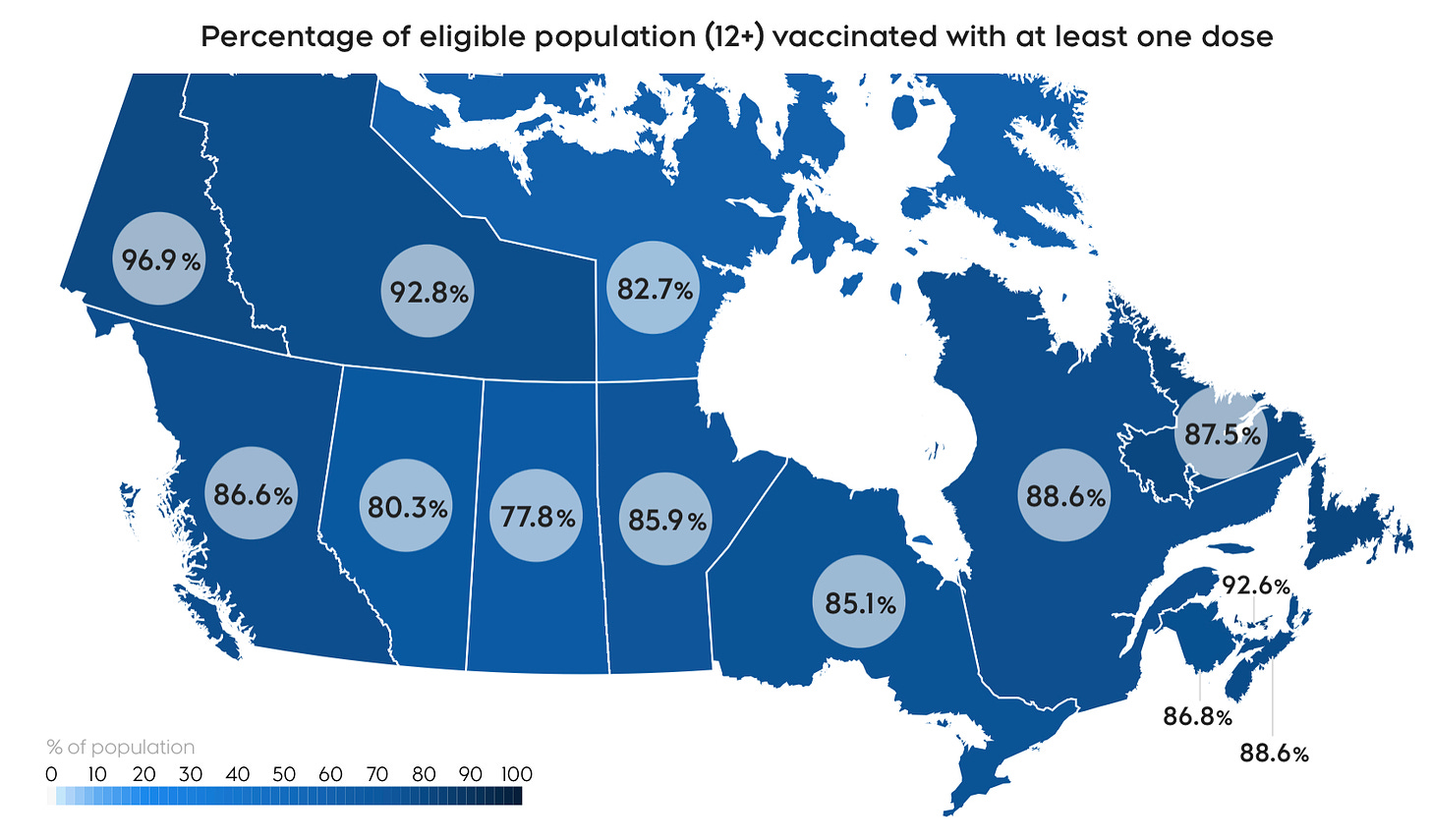The Evening Report - Sept 20
Pfizer/BioNTech say its vaccine is ready for children under 12, a potential game changer
💉
In a press release, Pfizer and BioNTech say that clinical trials for its COVID vaccine efficacy among children aged 5 to 11 years old have found the vaccine to be “safe and well tolerated.” The manufacturers say among children in clinical trials the vaccine provided “robust” antibody response against the coronavirus. The results pave the way for Pfizer and BioNTech to apply for regulatory approval for use among young children. Potentially this could mean vaccinations for children could begin, in some jurisdictions, within months.
The one caveat is that the information is contained only in a press release issued by the manufacturer today, and all the clinical trial data has yet to be released publicly. So while we hope this is good news, the company does have a vested interest and we will need to hear from other experts once the data is released and reviewed.
🇪🇺✈️🇺🇸
The Biden administration is going to open the borders in November to all fully vaccinated, non-essential travelers. The change impacts travel into the United States by air and does not extend to its land border crossings.
In November tourists and other travelers will have to show proof of vaccination. They will also still have to show a negative COVID test no more than 72 hours old.
White House Pandemic Coordinator Jeff Zients:
“International travel is critical to connecting families and friends; to fueling small and large businesses; to promoting the open exchange of ideas and culture. That’s why, with science and public health as our guide, we have developed a new international air travel system that both enhances the safety of Americans here at home and enhances the safety of international air travel.”
For unvaccinated Americans traveling home from abroad will have much stricter entry requirements. They will have to show a negative COVID test no more than 24 hours old before boarding their flight. They will also have to show proof they have purchased a test to take after arrival.
The U.S. Center for Disease Control and Prevention will also soon order airlines to collect contact information, including cell phone numbers and email addresses, for all inbound travelers for a new contact-tracing system.
For more than a year now, the White House has banned most travelers from the European Union, Iran, and China.
🇩🇰
As infections fall and Denmark waves goodbye to COVID restrictions, it is attracting attention around the world as other countries struggle with their pandemic situation. Political Science Professor Michael Bang Petersen, who headed the HOPE project and advised the Danish government, is making the rounds in American media. He is explaining the differences in the Danish approach to mass testing, very little polarization, and frank communication, and how it helped maintain social trust, ultimately helping battle the coronavirus.

-
The Danish Minister for Development, Møller Mortensen, tweeted today that Denmark has donated 115,000 vaccine doses to Morocco. This was arranged through the WHO-led international vaccine initiative COVAX, which is trying to supply developing countries with badly needed coronavirus vaccines.
However, Doctors Without Borders believes Denmark should be doing more to support the COVAX initiative.
Médecins Sans Frontières Head of Analysis Julia Raavad spoke to Danwatch last week.
“The fact is that we will have millions of surplus vaccines in Denmark, even though most of the entire population has been vaccinated and booster vaccines given to vulnerable groups. It is completely ridiculous when there is an urgent need for them to stop the pandemic in the world."
Denmark recently reached a deal with New Zealand to sell them 500,000 doses of the Pfizer/BioNTech vaccine.
-
On the vaccination front to date, 75.8% of the total population has one vaccine dose and 73.9% are fully vaccinated. The gap between 1st and 2nd doses is really narrowing and now just 109,735 vaccinations separate the two.
Yesterday there were 4,090 total inoculations done of which 1,004 were 1st doses.
-
Region Nordjylland is making some changes so that its mobile vaccination sites can offer a more robust service. The pop-up sites will now offer first, second, and third vaccine doses without the need for an appointment. Currently, the third booster dose is being offered to immunocompromised people who had less protection from the first two doses.
As well, the pop-up vaccination sites will also allow people who show up for their first dose to choose which vaccine they want, Pfizer or Moderna. This is an initiative recently rolled out nationally to try and convince more holdouts to get vaccinated.
Health Planning Chief Consultant Anders Cinicola:
“In the North Jutland Region we do not run into that many citizens who want a different vaccine than the one they have been assigned, but now we have the opportunity to offer them a choice if need be, and if it can help even more North Jutlanders to get vaccinated, then that is an advantage.”
The region says from August 27 to September 15 its mobile vaccination sites administered 503 inoculations.
This week the mobile vaccination vehicles will be busy setting up pop-up vaccination sites in Aalborg, Skagen, Frederikshavn, and some other locations.
-
Denmark is reporting 268 COVID infections and two more coronavirus deaths in the last day.
Yesterday there were 45,131 total corona tests done, 26,330 PCR and 18,801 rapid, for a positivity percentage of 1.01%.
-
While the overall number of infections continues to drop, the activity we are seeing remains concentrated among those under the age of 50. In the last seven days, the 10 to 19 years of age group registered the most infections among all age groups.
-
COVID hospitalizations (99) have inched upward (+1) while the number of infected people in an ICU (22) edged downward (-1) and of those the number on a ventilator (17) rose slightly (+1).
-
The pandemic seems to have ignited a fire among people in Denmark to choose to local travel at home rather than fly somewhere abroad.
Heidi Maimburg, director at Ribe Byferie Resort, says usually business tapers off in the winter months, but not this year as bookings soar.
“We are being stormed by holiday-loving Danes. Sure, we are used to having guests most of the year, but we had not expected this many. Although many have just finished their summer holidays, people in Denmark do not seem ready to finish exploring local destinations.”
Professor of Tourism at Aalborg University Martin Trandberg Jensen says the trend is not surprising.
“The pandemic has accelerated the general awareness of "slow travel" and the climate benefits of traveling locally and consuming sustainably. The new world situation has made many people start to consider how, where, and how often they travel.”
Another trend being noticed by Danish holiday destinations is a rise in people choosing to pamper themselves during their stay.
Independent Financial Analyst Lone Eriksen says this may be due in part to the savings of local travel versus international get-aways. But she also thinks the pandemic has made people value the things they missed and realize it’s okay to enjoy the time we have.
Eriksen also cautions that this may not be a permanent trend.
“The collective memory is short, and it will be exciting to see how the travel choices will be this winter, and whether we return to "normal" when the need for sun and heat arises.”
-
With COVID restrictions nightclubs and other nightlife venues can open their doors again and alcohol-fueled injuries are on the rise. After relatively low injury claims during the pandemic, one insurance company has already noticed an uptick in alcohol-related accidents and injuries.
Director of Injury Partnerships and Prevention Brian Wahl Olsen:
“Unfortunately, there are some who have been injured because they have had a little too much to drink. This results in mainly bicycle crashes and other types of falls that result in head and body injuries.”
Wahl Olsen says it is his hope that the pandemic will result in people taking better care of themselves and each other when they are out having a good time.
"I hope that many people stop and think. Remember to show consideration for each other, which we have been so good at during the pandemic, so we avoid the stupid accidents. Every year we see many people who are seriously injured due to alcohol.”
He advises people to leave their car keys and bicycles at home when they go out for drinks. He also notes that statistically young people in particular have a higher risk of alcohol-related accidents and injuries.
🇸🇪
Sweden will table its first COVID update of the week on Tuesday.
-
The Swedish Public Health Agency is moving up the schedule to begin vaccinating children between the ages of 12 and 15. The health agency approved the age group to begin vaccinations last week, saying then inoculations wouldn’t begin until November. Now, after consulting with the different Swedish regions, it says children can begin to be vaccinated as of October 11.
State Epidemiologist Anders Tegnell says this round of vaccinations needs to be more school-based.
“We recommend that the health service cooperates with schools so that all children are offered vaccines on equal terms. At the same time, we need to remind ourselves that the work of reaching adults with vaccination needs to continue with the same vigor to reduce the spread of infection in society.”
While the Swedish Public Health Agency circles October 11 on its calendar, not all regions are waiting until then. Region Stockholm has already announced it would begin the process of vaccinating 12 to 15 year olds as of today.
The national health agency says it will release the basis for recommending vaccinations for children under 16 years of age soon.
-
Young people aged 12 to 15 years old can now book a vaccination appointment in Region Stockholm, but the first appointments to actually get the jab might still be a few weeks away.
Vaccine Coordinator Magnus Thyberg:
“Vaccinations for the age group start on October 4. If it turns out that we get the last administrative parts put in place, it may be brought forward. I expect it to be ready within a few days, but for safety's sake, the earliest times right now can be booked until October 4.”
Most 12 to 15 year olds will be vaccinated in their schools. This will not require having to book a vaccination appointment. The region says for young people who don’t want to wait, they can schedule a time at a vaccination center and begin the process a little quicker.
Parents or guardians will have to sign a consent form for their child to get vaccinated. At least one parent or guardian must accompany the child when they get vaccinated.
-
In Southern Sweden, Region Skåne is also getting ready to vaccinate the 12 to 15 year old age group.
Vaccine Coordinator and Assistant Infection Control Doctor Per Hagstam:
“The fact that this group is also getting vaccinated means that we will have even better conditions to limit the spread of infection. School-age children have also been affected by infection control measures such as distance learning, school closures, and restrictions on leisure activities, which has also affected their mental health.”
In Skåne, the health centers are given responsibility for carrying out the vaccination of 12-15-year-olds in close collaboration with the schools.
“The best thing for the children and their learning is that vaccinations take place in schools. Interruptions from classes are reduced and they do not have to leave school. It also provides the best conditions for good vaccination coverage.”
The region says it is currently consulting with all stakeholders to put the details together.
🇳🇴
Norway has added 481 infections and had no new deaths since yesterday’s update.
COVID hospitalizations (122) have shot upward (+17) while the number of infected people in an ICU (33) is unchanged, and of those the number on a ventilator (20) crept up (+1).
So far, 75.36% of Norwegians 18 years old and older have at least one vaccine dose and 65.89% have had both doses.
-
Norway is getting ready to return to near-normal. After meeting with all regional and municipal governments on Friday Norway’s Health Minister Bent Høie says they must be ready to transition back to “normal everyday life with increased preparedness” at short notice. But, he adds, no firm date has yet been set for the country to remove its COVID restrictions and fully reopen.
“I have today sent a letter to the country's municipalities in which I inform them that it may take a short time from when the government communicates the decision to proceed with the reopening until the decision is implemented, and the national COVID restrictions cease. Some municipalities may still need some restrictions. In those cases they must then adopt local regulations at very short notice.”
While a reopening date hasn’t been set in stone Norway’s health ministry is advising local government’s to have their own draft COVID regulations prepared and ready to be quickly implemented on Friday September 24.
-
Norwegian health authorities say coronavirus may be here to stay and will now be like the flu.
Norwegian Institute of Public Health Assistant Director Geir Bukholm spoke to VG:
“We are now in a new phase where we must look at coronavirus as one of several respiratory diseases with seasonal variation.”
It bases the view of COVID on the fact that despite towering vaccination levels in Norway, they continue to see the coronavirus still circulating. Although the agency notes that with vaccines it is no longer causing a major burden on hospitals.
Bukholm is also quick to point out that he is not saying the pandemic is over.
“No, really not. The pandemic is not over as long as it exists in the world and in countries where vaccine coverage is still low.”
🇫🇮
The Finnish Institute for Health says it is dealing with some technical issues impacting coronavirus case reporting. While the number on the graphic below says 0 new cases today, the agency says there are actually at least 341 new infections over the last day.
So far, 4,104,928 1st dose vaccinations (73.3% of the total population) have been administered in Finland, while 3,271,763 people (58.6%) are fully vaccinated. It is worth noting that the Finnish vaccination effort is also slowing to a crawl.
-
Finland is adjusting its COVID testing guidelines for young kids and recommendations for schools when a child has tested positive. Children under the age of 12 should now only get tested in specific circumstances.
The child has symptoms and has had a recent COVID exposure
The child has symptoms and they are living with unvaccinated or at risk people
A doctor recommends the child be tested
For children over the age of 12 who are not vaccinated, they should get tested any time they have symptoms.
The Finnish Institute for Health says children with a cough, cold, or fever must stay home.
Chief Physician Emmi Sarvikivi:
“If he or she has a runny nose, fever or cough, for example. However, contacts outside the family should be avoided until the symptoms have clearly eased. When the symptoms are clearly reduced and the child is clearly better, he or she can return to school or kindergarten. As with other viral infections, infectivity of the virus decreases rapidly after the onset of symptoms.”
The health institute says schools no longer need to send entire classes home due to an infection. It says the data so far shows the infection spread in a classroom is very low. Instead, the isolation requirement will be focused on the child testing positive and those deemed to be in close contact.
“The risk of infection in schools has proven to be low. For example, in the school year 2020-2021, only 1.9 per cent of those exposed in more than 95,000 early childhood education, schools, or educational institutions became infected.”
It is important to note the rules have flexibility allowing a doctor or local health official to adjust any school-related COVID response according to the situation at hand.
🇩🇪
“Every single vaccination helps everyone to have a safe winter” Germany’s Health Minister Jens Spahn continues to urge people to get vaccinated as the inoculation campaign inches along. So far, 55.9 million people (67.2%)have one vaccine dose and 52.5 million (63.1%) are fully vaccinated.
Spahn says this equates to 78% of the adult population and almost 40% of those 12 to 17 years of age being vaccinated.
🇺🇳
The United Nations Office for the Coordination of Humanitarian Affairs (UNOCHA) is warning about massive global vaccination inequality. It says 75% of the global vaccination supply has gone to just ten of the world’s wealthiest countries. While 0.3% of available vaccine doses have been administered in low-income countries. It says this “staggering inequality” in the vaccination roll-out must end and that there needs to be a more equitable way to vaccinate everyone.
UN Resident Coordinator Ingrid Macdonald
“Even though everyone has come together and everyone has been generous in terms of putting money into the COVAX initiative, which is absolutely critical and really important, what we saw was that suddenly all the vaccines were taken up by other countries that had purchased them. The worry is that it’s this whole inequity and inequality. Certain countries that get everything and are now some of them are even not only having the second vaccine [dose] but the third vaccine [dose]. And then you have other countries around the world that almost have nobody that has been vaccinated.”
🇨🇦
The Canadian government’s COVID dashboard has still not been updated since Friday.
-
So far, the Canadian vaccination effort has administered 28,636,589 1st vaccine doses (75.22% of the total population) while 26,388,217 people (69.31%) are fully vaccinated.
In Ontario today there were 610 new infections, of which 458 were people who were either unvaccinated or who had a single dose. There are 233 people in hospital and 177 in an ICU. So far, nearly 85.1% of people in the province have one dose and 79.1% have two.
Quebec reported 679 infections today. On Saturday there were 821 and another 741 on Sunday.
In Atlantic Canada, New Brunswick recorded 199 infections over the last three days. Newfoundland and Labrador had 15. Nova Scotia registered 55.
Manitoba saw 156 infections and one more virus death today.
There were 519 infections in Saskatchewan today. That is the 2nd highest daily number of infections to date.
Alberta and B.C. have yet to report and will table three days worth of data later today.




